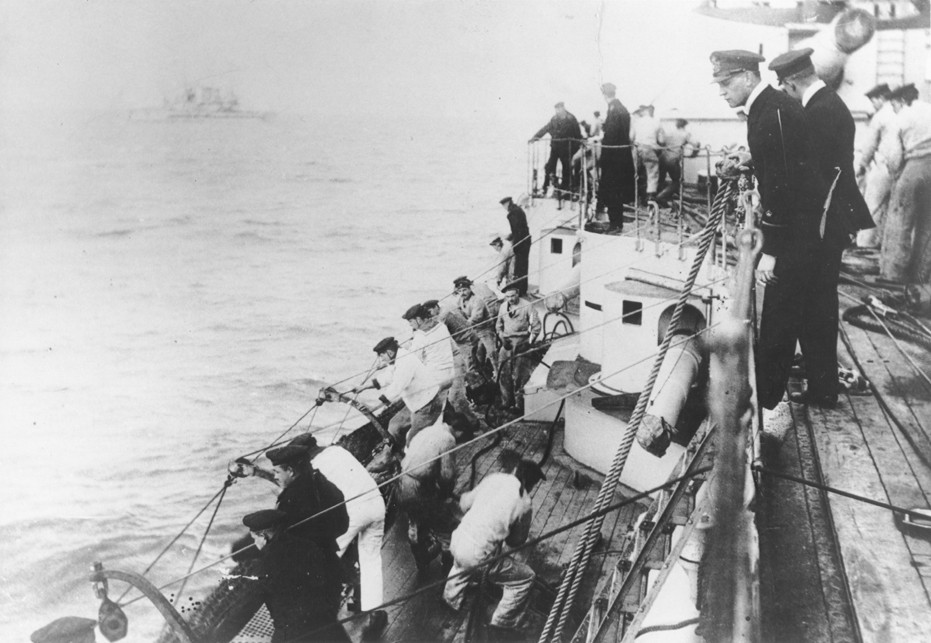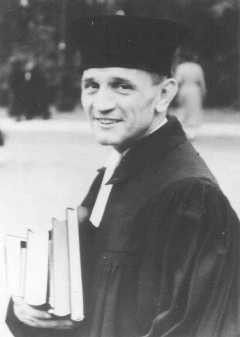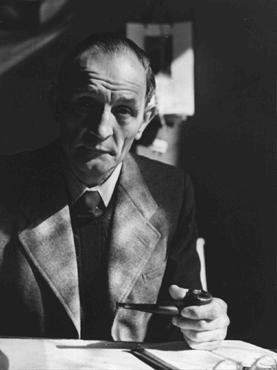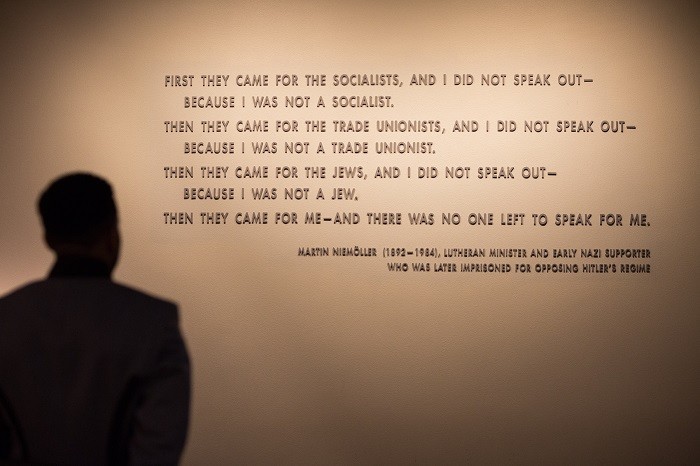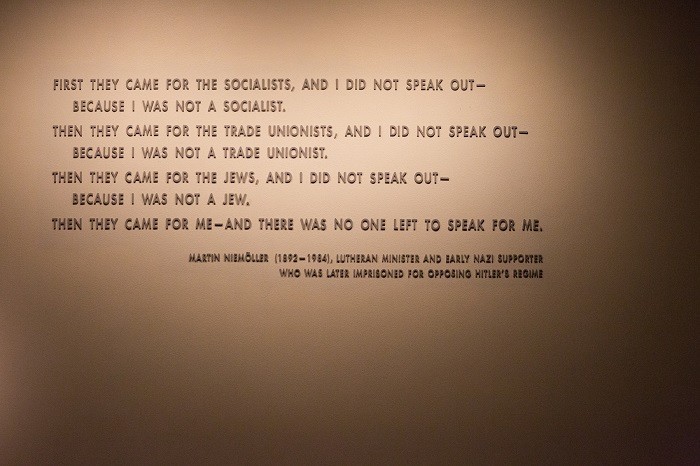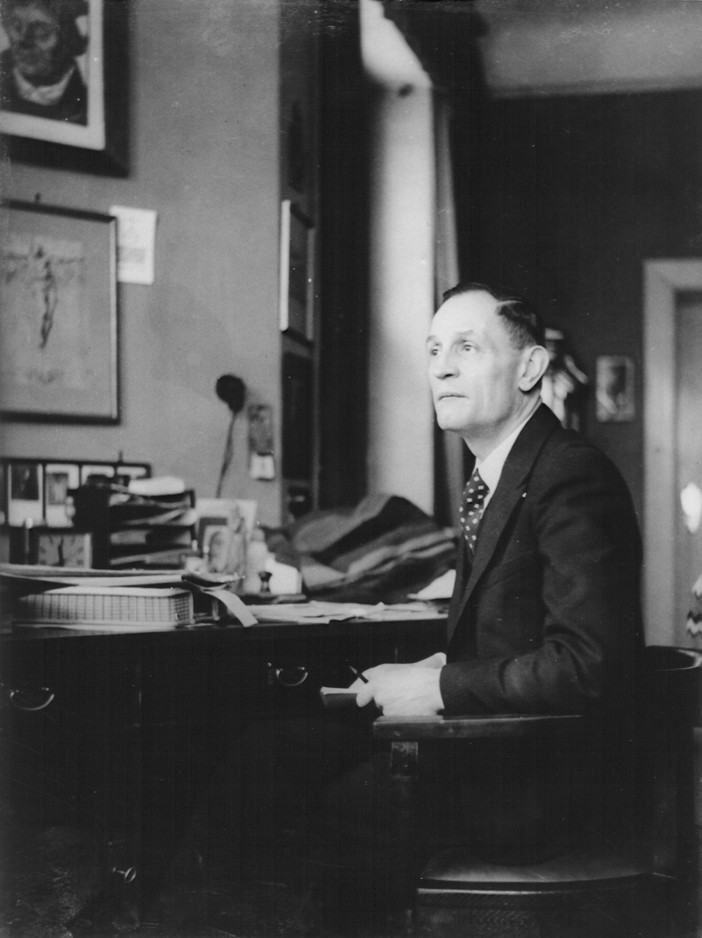
Martin Niemöller: Biography
Martin Niemöller (1892–1984) was a prominent Protestant pastor who emerged as an outspoken public foe of Adolf Hitler and spent the last seven years of Nazi rule in concentration camps, despite his ardent nationalism. Niemöller is perhaps best remembered for the quotation: “First they came for the socialists, and I did not speak out...”
The son of Lutheran pastor Heinrich Niemöller, Martin Niemöller was born in the Westphalian town of Lippstadt, Germany, on January 14, 1892. In 1910 he became a cadet in the Imperial German Navy. With the outbreak of World War I in 1914, Niemöller was assigned to a U-Boat, of which he was eventually appointed the commander. Under the stipulations of the armistice of November 11, 1918, that ended hostilities in World War I, Niemöller and other commanders were ordered to turn over their U-Boats to England. Along with many others, Niemöller refused to obey this order, and was, as a consequence, discharged from the Navy.
In 1920, he decided to follow the path of his father and began seminary training at the University of Münster. He married Else Bruner on April 20, 1919. The couple had 6 children.
Niemöller's pro-monarchist convictions and nationalism made him critical of the Weimar Republic, which he perceived to be weak and vulnerable to a Communist uprising. Because he believed that the Republic, led by those who signed the Treaty of Versailles, had crippled Germany, he supported the unsuccessful Kapp-Lüttwitz Putsch that aimed to overthrow the government in 1920. At this time Niemöller had been a member of an organization of right-wing students called the Academic Defense Corps (Freikorps), which was disbanded and disarmed on April 23, 1920, after the failure of the Kapp putsch.
As inflation and economic and political turmoil increased in Germany during 1922, Niemöller took a part-time job laying tracks for the railroads while continuing his seminary studies. In 1923, Niemöller began working with the Lutheran Home Mission of Westphalia, an organization which oversaw the social welfare activities of the Evangelical Lutheran Church in Westphalia. In 1931, he resigned from this position and became the junior pastor of Saint Anne's Church, located in a wealthy and much sought-after parish in the Berlin suburb of Dahlem.
Niemöller's sermons reflected his strong nationalist sentiment. He felt that reparations, democracy, and foreign influence had led to damaging social fragmentation and an overemphasis on the individual in German society. Niemöller believed that Germany needed a strong leader to promote national unity and honor. When Hitler and the National Socialist Party emerged, touting nationalist slogans and advocating autonomy for private worship of the Christian faith, Niemöller voted for the Nazis—both in the 1924 Prussian state elections and in the final national parliamentary elections of March 1933.
Hitler espoused the importance of Christianity to German nationality and Christianity's role in a renewal of national morality and ethics, leading Niemöller to enthusiastically welcome the Third Reich. Niemöller later confessed that even Hitler's antisemitism reflected a more extreme version of his own prejudice at that time.
Niemöller's conflicts with National Socialism emerged out of his opposition to the German Christians, a pro-Nazi faction within the German Protestant Church that sought to apply Nazi racial dogma to church membership in such a way as to bar so-called non-Aryans (people considered Jewish under Nazi racial laws) from the ministry and from religious teaching positions.
The ideology of the German Christians was expressed in the speech of one of their leaders, Dr. Reinhold Krause, at the 1933 Sports Palace Rally. Depicting Martin Luther as a militant symbol for the preservation of German race and culture, the German Christians embraced Nazi racial ideology and demanded that all Jewish elements, including the Old Testament, be excluded from Christian theology. This rally was seen as blasphemous and led to a radical drop in support for the German Christians. But attacks on “non-Aryan” church members had already led Niemöller and others to establish the Pastors Emergency League (PEL) in September 1933. The PEL opposed the introduction of racialized criteria for clergy and combated the German Christian agenda.
The PEL was the forerunner of the Confessing Church, a Protestant church faction that was founded in May 1934 to oppose German Christian leadership. Niemöller became a leading figure in the Confessing Church. He made the following arguments against the German Christians:
- the politicizing of church leadership positions was an unwarranted interference of the state in the apparatus of the church and served to suppress minority opinions within the Lutheran Church;
- bestowing a divine essence upon German history and culture encouraged atheist nationalism and discouraged Christian faith; and
- by expelling converted Jews from the church, the German Christians were elevating the so-called science of race above the divine ceremony of baptism.
Yet the PEL had repeatedly stressed that criticism of the Nazi state was confined to internal church matters. Niemöller's doctrinal opposition to the German Christians did not initially alter his political support for Hitler and the Nazis. When Hitler defiantly led Germany out of the League of Nations in October 1933, Niemöller (representing the PEL) sent him a telegram of congratulations, emphasizing the patriotism of PEL members. Moreover, antisemitism was widespread within the PEL and subsequently in the Confessing Church. Niemöller remained an outspoken antisemite throughout the 1930s, justifying his prejudices by referring to Christian teachings that the Jews were guilty of deicide, the killing of Jesus.
In a 1935 sermon, Niemöller described the Jews as “a highly gifted people which produces idea after idea for the benefit of the world, but whatever it takes up changes into poison, and all that it ever reaps is contempt and hatred.” Niemöller's opposition to racial laws was only on behalf of people who had converted to Christianity, and even here he initially favored the establishment of a separate church for them.
A turning point in Niemöller's political sympathies was a January 1934 meeting of Adolf Hitler, Niemöller, and two prominent Protestant bishops to discuss state pressures on churches. At the meeting it became clear that Niemöller's phone had been tapped by the Gestapo (German Secret State Police) and that the PEL was under close state surveillance. Following the meeting, the two bishops signed a statement of unconditional loyalty to the Führer. In contrast, Niemöller had come to see the Nazi state as a dictatorship, one which he would oppose.
These doctrinal disputes induced Niemöller and others to found the Confessing Church in May 1934. The Confessing Church declared itself to be the one true Lutheran Church in Germany, deriving inspiration directly from God. A charismatic preacher, Niemöller soon became widely known throughout Berlin for his critical sermons. Despite warnings from the police, he continued to preach against the state's attempts to interfere with church governance and what he viewed as the neo-paganism encouraged by the Nazis. As a consequence, Niemöller was repeatedly arrested between 1934 and 1937.
In July 1937, Gestapo officials arrested Niemöller again, charged him with “treasonable statements” and incarcerated him in the Moabit Prison in Berlin for seven and a half months, until his trial, in solitary confinement. In February 1938, he was convicted under the Law for the Prevention of Treacherous Attacks on State and Party and the Law for the Maintenance of Respect for Party Uniforms and sentenced to seven months detention and a fine of 2,000 Reichsmarks. Although his prison sentence had been served awaiting trial, the Gestapo placed Niemöller under a protective detention (Schutzhaft) order and incarcerated him in Sachsenhausen concentration camp, again in solitary confinement.
Even while incarcerated, Niemöller remained a complex figure whose opposition to Nazism was juxtaposed with a strong nationalism. Whether because of emotional distress or a continued commitment to German nationalist and expansionist ideals, he attempted to reenlist in the Navy, appealing by letter from Sachsenhausen to Admiral Erich Raeder, commander-in-chief of the German Navy, in 1938 and again in 1941. In September 1939, he wrote to a former colleague in the military, asking that he be released from the concentration camp so that he could fight for Germany. In 1941, Gestapo officials transferred Niemöller to Dachau, where he shared a barrack room with Catholic dissenters and was permitted access to books.
After more than seven years of incarceration, Niemöller was liberated by US troops in Tirol, Austria, after being transported by the SS from Dachau along with other political prisoners.
In 1947, he was elected as president of the Hessen-Nassau Lutheran Church and began a world tour preaching collective guilt for Nazi persecution and crimes against humanity. His ideas are best reflected in the Stuttgart Confession of Guilt (Stuttgarter Schuldbekenntnis), written mainly by Niemöller in October 1945 and issued in the name of the German Evangelical Church.
In the wake of Nazism, Niemöller's prominence as an opposition figure gave him international stature though he remained controversial. In Germany, he quickly became unpopular because of his call for acknowledgment of collective German guilt. He emphasized the particular guilt of the German churches for their support of Nazism. Niemöller's political discourse, however, continued to display some of the prejudices that led him to welcome the Nazi rise to power in 1933. He blamed the weakness of the parliamentary Weimar Republic for the rise of Hitler and failed to explicitly repudiate Hitler's political aims, condemning unequivocally only Nazi interference in religious matters.
Niemöller also attacked Allied authorities for their handling of denazification proceedings, issuing an ecclesiastical edict forbidding church members from sitting on denazification arbitration tribunals. He also advocated the speedy release of German prisoners of war. Niemöller's German nationalist sentiment never wavered as he railed against the division of Germany by the Allies, stating that he preferred unification even if it were under Communism. Nonetheless, Niemöller became a popular figure abroad. He delivered the opening address at the 1946 meeting of the Federal Council of Churches in the United States and traveled widely speaking about the German experience under Nazism.
By the mid-1950s, Niemöller had become a pacifist. He worked with a number of international groups, including the World Council of Churches, for international peace. Niemöller died on March 6, 1984 at the age of 92.
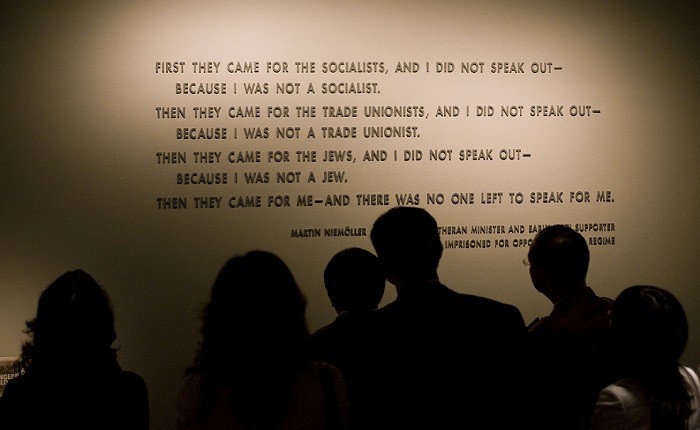
Critical Thinking Questions
What pressures and motivations moved Niemöller to support Nazi ideology in the early 1930’s?
What ideas or events affected his thinking? How did the Nazi government respond?
Investigate other Protestant clergy who did not embrace Nazi beliefs. What risks did they face?


